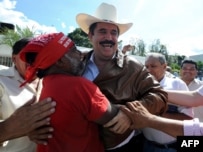Honduras deep in crisis again with Zelaya return
| Publisher | Radio Free Europe/Radio Liberty |
| Publication Date | 22 September 2009 |
| Cite as | Radio Free Europe/Radio Liberty, Honduras deep in crisis again with Zelaya return, 22 September 2009, available at: https://www.refworld.org/docid/4ac078be1a.html [accessed 19 May 2023] |
| Disclaimer | This is not a UNHCR publication. UNHCR is not responsible for, nor does it necessarily endorse, its content. Any views expressed are solely those of the author or publisher and do not necessarily reflect those of UNHCR, the United Nations or its Member States. |
September 22, 2009
 Supporters cheer and greet ousted Honduran President Manuel Zelaya (center) as he arrives at the Brazilian Embassy in Tegucigalpa on September 21.
Supporters cheer and greet ousted Honduran President Manuel Zelaya (center) as he arrives at the Brazilian Embassy in Tegucigalpa on September 21.
TEGUCIGALPA (Reuters) – Honduras was deep in crisis after President Manuel Zelaya's surprise return to the Central American country raised the specter of violent street protests and a diplomatic fight with Brazil.
Zelaya, a leftist, sneaked back into the country on September 21 and took refuge in the Brazilian Embassy to avoid arrest, almost three months after he was toppled in a coup.
Several thousand supporters held a rally at the embassy to back Zelaya, but the pro-coup government that has ruled Honduras since late June announced a curfew for September 21 and 22 to dampen protests.
U.S. Secretary of State Hillary Clinton warned against passions running high in Honduras, a U.S. ally during Cold War conflicts in Central America.
"Both sides have supporters who need to be restrained and careful in their actions in the days ahead," she said in New York on September 21 after talks with Costa Rican President Oscar Arias, whose mediation efforts in Honduras have so far failed.
"There ultimately in the next hours has to be some effort to bring the parties together to resolve this between them," Clinton said.
Soldiers toppled Zelaya at gunpoint and sent him into exile in his pajamas on June 28 in a dispute over presidential term limits.
He urged supporters on September 21 to head to the capital to back him and reverse the coup.
Zelaya's ouster plunged Honduras into its worst political conflict in decades, and was condemned by U.S. President Barack Obama, the European Union and Latin American governments.
But a Honduran government elected by Congress on the day of the coup has dug its heels in, refusing to allow Zelaya to return unless he faces charges for corruption and trying to change the constitution.
"I insist that the courts are waiting so he can present himself there and pay for the crimes he committed," interim ruler Roberto Micheletti said late on September 21. He said he would not renew crisis talks that were chaired by Arias and aimed at returning Zelaya to power.
Long Curfew
Micheletti's government slapped a curfew on the whole of the country until at least the evening of September 22 to avoid protests and warned that Brazil would be "directly responsible for violent acts that could take place inside or outside" the embassy.
There was no sign of Honduran security forces seeking to storm the embassy and grab Zelaya but Brazilian Foreign Minister Celso Amorim told reporters that "any threat to the Brazilian embassy would be a grave breach of international law."
Many Latin American governments will now be looking to the United States to make good on promises of support for Zelaya by pressuring the pro-coup administration in Honduras to cede power.
Zelaya was due to leave office in January after elections in November.
The leftist said he braved many obstacles, crossing over mountains and through valleys to avoid military checkpoints and arrive in Tegucigalpa.
Link to original story on RFE/RL website
